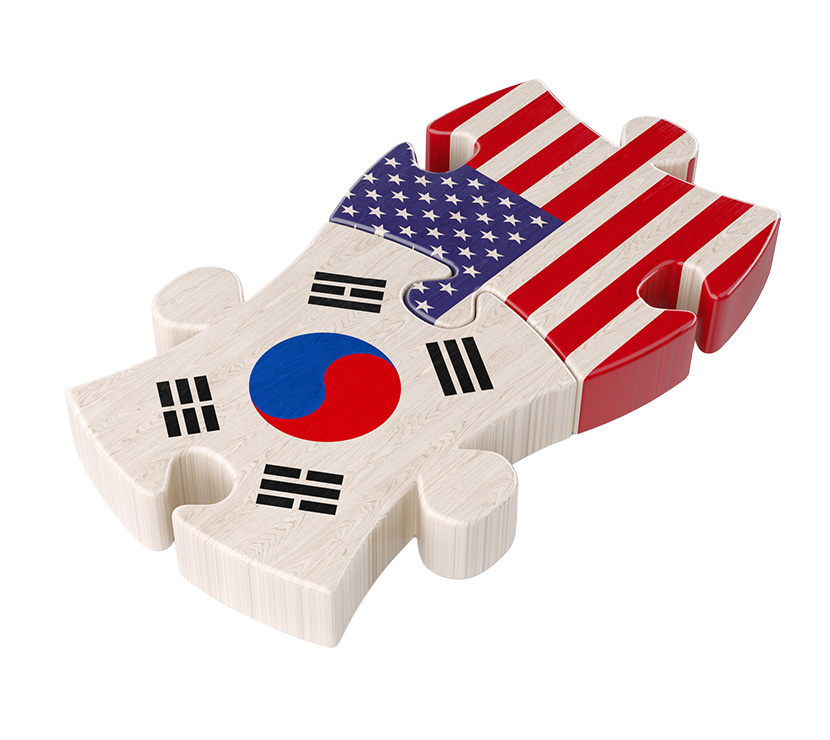
Korea
Helping Korean businesses succeed in the United States
Our Korea practice team, led by June Lee, represents Korea-based businesses seeking to operate in the United States. The team, consisting of fluent Korean-speaking lawyers with more than 80 years of combined experience working with or at Korean companies, collaborates with clients to achieve their business goals and growth objectives.
The team covers the bases—corporate, finance, regulatory and transactional—by providing business-oriented legal counsel on
- First-time operations in the United States – We help client efforts to secure state and local incentives; locate, acquire, and construct and retrofit sites; address environmental issues; structure legal entities; safeguard technology transfer; obtain immigration visas for non-U.S. personnel; and set up employment policies and procedures and employee benefits plans.
- Compliance with government and industry regulations – We break apart the maze of federal, state, and local regulations; clarify clients’ legal obligations; and create compliance programs in the tax, employment, environmental, U.S. trade, and many other areas. We also advise Korean companies of pertinent U.S. industry regulations.
- Continuing operations – We help public companies and large private companies adopt good practices on governance, oversight, and stockholder relations. For Korean businesses without in-house counsel, we offer general counsel services. On the intellectual property side, we help create and protect patent and trademark portfolios.
- Growth strategy and activities – The team advises on site expansion, additional sites and relevant incentives; buy-sell transactions; joint ventures; and investment opportunities and transactions.
- Dispute Resolution – The team works with the firm’s litigation group to assist our Korean clients with coordination and strategy in international disputes.
Alliance with Korean law firms
We have long-established relationships with the top law firms in Korea. We work with them to help U.S. businesses embark on new enterprises in Korea. The firms also refer Korean businesses to us to help them establish operations in the United States.
An understanding of Korean business culture
Through years of experience working for Korean and multinational companies, our lawyers are practiced hands with Korean business culture and customs. They understand the culture’s communication and negotiation styles, relationship-building focus, and the decision-making process. Their knowledge and experience help meet clients’ legal needs smoothly and efficiently.
Clients span diverse industries
- Automotive
- Consumer goods
- Defense
- Electronics
- Energy
- Financial institutions
- Infrastructure
- Manufacturing
Our services include
- Business Immigration
- Commercial Lending and Real Estate
- Corporate and Securities
- Corporate Governance
- Customs and International Trade
- Economic Development
- Employment and Labor
- Executive Compensation, ERISA, Employee Benefits
- General Counsel Services
- Intellectual Property
- Mergers & Acquisitions
- Private Equity
- Tax
The future of KORUS
The U.S.-Korea Free Trade Agreement (KORUS) went into effect in 2012. The treaty rolled back 95% of each nation's tariffs on goods within five years, increased intellectual property rights, and established new protections for multinational financial services and other firms. Most of our Korea-based clients import parts or materials from their Korean parent companies. Last spring, the Trump administration announced its plan to re-negotiate or terminate the deal. On Sept. 25, 2018, U.S. and South Korea signed the revised KORUS which took effect as of January 2019. The revision will have serious consequences for both U.S. and South Korean companies benefiting from the treaty’s provisions. Our lawyers advise our clients on relevant developments and how the amended FTA may affect their operations.
Why Nelson Mullins?
- Lawyers with more than 60 years’ combined experience working with or at Korean companies
- Fluent Korean-speaking lawyers with a full understanding of Korean business culture and customs
- Experience working on economic development projects for companies from Korea and more than 20 other countries
- Resources to represent U.S. companies seeking business opportunities in Korea
- Legal advice guided by clients’ business goals and rooted by a practical business perspective
- A full suite of corporate, finance, and transactional legal services to structure, manage, and grow the business
- Comprehensive counsel on myriad federal, state, local, and industry regulations to promote compliance and minimize disruption of operations
Why Nelson Mullins?
- Lawyers with more than 60 years’ combined experience working with or at Korean companies
- Fluent Korean-speaking lawyers with a full understanding of Korean business culture and customs
- Experience working on economic development projects for companies from Korea and more than 20 other countries
- Resources to represent U.S. companies seeking business opportunities in Korea
- Legal advice guided by clients’ business goals and rooted by a practical business perspective
- A full suite of corporate, finance, and transactional legal services to structure, manage, and grow the business
- Comprehensive counsel on myriad federal, state, local, and industry regulations to promote compliance and minimize disruption of operations
Why Nelson Mullins?
- Lawyers with more than 60 years’ combined experience working with or at Korean companies
- Fluent Korean-speaking lawyers with a full understanding of Korean business culture and customs
- Experience working on economic development projects for companies from Korea and more than 20 other countries
- Resources to represent U.S. companies seeking business opportunities in Korea
- Legal advice guided by clients’ business goals and rooted by a practical business perspective
- A full suite of corporate, finance, and transactional legal services to structure, manage, and grow the business
- Comprehensive counsel on myriad federal, state, local, and industry regulations to promote compliance and minimize disruption of operations
Why Nelson Mullins?
- Lawyers with more than 60 years’ combined experience working with or at Korean companies
- Fluent Korean-speaking lawyers with a full understanding of Korean business culture and customs
- Experience working on economic development projects for companies from Korea and more than 20 other countries
- Resources to represent U.S. companies seeking business opportunities in Korea
- Legal advice guided by clients’ business goals and rooted by a practical business perspective
- A full suite of corporate, finance, and transactional legal services to structure, manage, and grow the business
- Comprehensive counsel on myriad federal, state, local, and industry regulations to promote compliance and minimize disruption of operations
Experience
Following is a selected sampling of matters and is provided for informational purposes only. Past success does not indicate the likelihood of success in any future matter.
- Negotiated tax and economic incentives for numerous large and small Korean investment projects in Alabama, Georgia, and in Tennessee
- Negotiated construction contracts
- Negotiated and defended OSHA citations
- Defended EEOC charges
- Managed product liability lawsuits
- Defended employee lawsuits
- Defended DOJ investigations
- Defended labor union movements
- Prepared and advised on various domestic and international contracts
- Advised on corporate structures and established hundreds of Korean-owned subsidiaries
Why Nelson Mullins?
- Lawyers with more than 60 years’ combined experience working with or at Korean companies
- Fluent Korean-speaking lawyers with a full understanding of Korean business culture and customs
- Experience working on economic development projects for companies from Korea and more than 20 other countries
- Resources to represent U.S. companies seeking business opportunities in Korea
- Legal advice guided by clients’ business goals and rooted by a practical business perspective
- A full suite of corporate, finance, and transactional legal services to structure, manage, and grow the business
- Comprehensive counsel on myriad federal, state, local, and industry regulations to promote compliance and minimize disruption of operations
The team covers the bases—corporate, finance, regulatory and transactional—by providing business-oriented legal counsel on
- First-time operations in the United States – We help client efforts to secure state and local incentives; locate, acquire, and construct and retrofit sites; address environmental issues; structure legal entities; safeguard technology transfer; obtain immigration visas for non-U.S. personnel; and set up employment policies and procedures and employee benefits plans.
- Compliance with government and industry regulations – We break apart the maze of federal, state, and local regulations; clarify clients’ legal obligations; and create compliance programs in the tax, employment, environmental, U.S. trade, and many other areas. We also advise Korean companies of pertinent U.S. industry regulations.
- Continuing operations – We help public companies and large private companies adopt good practices on governance, oversight, and stockholder relations. For Korean businesses without in-house counsel, we offer general counsel services. On the intellectual property side, we help create and protect patent and trademark portfolios.
- Growth strategy and activities – The team advises on site expansion, additional sites and relevant incentives; buy-sell transactions; joint ventures; and investment opportunities and transactions.
- Dispute Resolution – The team works with the firm’s litigation group to assist our Korean clients with coordination and strategy in international disputes.
Alliance with Korean law firms
We have long-established relationships with the top law firms in Korea. We work with them to help U.S. businesses embark on new enterprises in Korea. The firms also refer Korean businesses to us to help them establish operations in the United States.
An understanding of Korean business culture
Through years of experience working for Korean and multinational companies, our lawyers are practiced hands with Korean business culture and customs. They understand the culture’s communication and negotiation styles, relationship-building focus, and the decision-making process. Their knowledge and experience help meet clients’ legal needs smoothly and efficiently.
Clients span diverse industries
- Automotive
- Consumer goods
- Defense
- Electronics
- Energy
- Financial institutions
- Infrastructure
- Manufacturing
Our services include
- Business Immigration
- Commercial Lending and Real Estate
- Corporate and Securities
- Corporate Governance
- Customs and International Trade
- Economic Development
- Employment and Labor
- Executive Compensation, ERISA, Employee Benefits
- General Counsel Services
- Intellectual Property
- Mergers & Acquisitions
- Private Equity
- Tax
The future of KORUS
The U.S.-Korea Free Trade Agreement (KORUS) went into effect in 2012. The treaty rolled back 95% of each nation's tariffs on goods within five years, increased intellectual property rights, and established new protections for multinational financial services and other firms. Most of our Korea-based clients import parts or materials from their Korean parent companies. Last spring, the Trump administration announced its plan to re-negotiate or terminate the deal. On Sept. 25, 2018, U.S. and South Korea signed the revised KORUS which took effect as of January 2019. The revision will have serious consequences for both U.S. and South Korean companies benefiting from the treaty’s provisions. Our lawyers advise our clients on relevant developments and how the amended FTA may affect their operations.
Following is a selected sampling of matters and is provided for informational purposes only. Past success does not indicate the likelihood of success in any future matter.
- Negotiated tax and economic incentives for numerous large and small Korean investment projects in Alabama, Georgia, and in Tennessee
- Negotiated construction contracts
- Negotiated and defended OSHA citations
- Defended EEOC charges
- Managed product liability lawsuits
- Defended employee lawsuits
- Defended DOJ investigations
- Defended labor union movements
- Prepared and advised on various domestic and international contracts
- Advised on corporate structures and established hundreds of Korean-owned subsidiaries
- Lawyers with more than 60 years’ combined experience working with or at Korean companies
- Fluent Korean-speaking lawyers with a full understanding of Korean business culture and customs
- Experience working on economic development projects for companies from Korea and more than 20 other countries
- Resources to represent U.S. companies seeking business opportunities in Korea
- Legal advice guided by clients’ business goals and rooted by a practical business perspective
- A full suite of corporate, finance, and transactional legal services to structure, manage, and grow the business
- Comprehensive counsel on myriad federal, state, local, and industry regulations to promote compliance and minimize disruption of operations
Highlights from Insights







